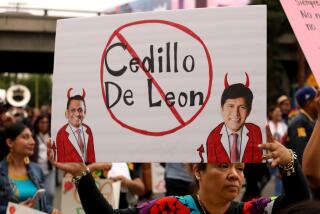The Dole Predicament
- Share via
WASHINGTON — Even Bob Dole might admit that this is his last chance at the presidency. I remember suggesting to him in 1987 that he give up the minority leadership of the Senate and spend full time running for president. “After all,” I said, “if a Republican wins in 1988, the nomination won’t be available again until 1996, and you’ll be 72 by then.”
He grunted. He didn’t resign the minority leadership nor did he win the Republican nomination for president. Now it’s 1996, and he’s running for president again.
For Dole, there is good news and bad news about his present position. Obviously, there is great reluctance to simply give him the nomination, as he demands. But, so far, this hasn’t ripened into an “anybody but Dole” attitude. Hehas the strong backing of the Republican establishment, plus better organization and more money than his two closest pursuers.
Lamar Alexander says Dole should step aside and let a younger man such as himself challenge Patrick J. Buchanan. But voters, so far, don’t have any clear idea of what Alexander would do in office. To many, he appears to be an “insider” claiming to be an “outsider,” and is very short on particulars when it comes to important issues. He has been a convenient parking place in Iowa and New Hampshire for those who could not bring themselves to vote for Dole and cannot vote for Buchanan. Unless he can quickly find a better voice, or Dole self-destructs, there is nowhere for Alexander’s candidacy to go.
Buchanan has benefited from low turnouts in Iowa and New Hampshire. Fully 35,000-40,000 fewer voters participated in the Iowa caucuses than expected. While the turnout in New Hampshire among registered Republicans wasn’t bad, independents, who can vote in the Republican primary there, disdained the race. Buchanan has a solid base of support among social conservatives and has added disgruntled workers who are unsure of their economic future. In the Republican Party, there is an upper limit of support for this kind of appeal; it can range between 20%-35%, depending on the state and the turnout.
So, if you are Dole looking at this picture, what should you do? One priority is to get Alexander out of the race as quickly as possible. Therefore, you should stop attacking him and send emissaries to discuss how this can be accomplished.
A good emissary would be former Sen. Howard H. Baker Jr. of Tennessee. Such missions are delicate, but Baker has been a patron of Alexander throughout the former governor’s political career and possesses the acumen to deal with the sensitivities involved. If Alexander hasn’t won anything by the end of Super Tuesday (March 12), he should withdraw, anyway.
Another priority for Dole is to activate the Republican political establishment, which has passively supported him. He has the endorsement of 24 Republican governors, together with a wide variety of his colleagues in the Senate. They must all realize that they have something at stake in the outcome of the race. If Buchanan were ever nominated, the ability of Republicans to continue to control the Congress would be thrown into severe doubt. Even those who have not endorsed Dole should be encouraged to comment on the Buchanan candidacy.
Buchanan may have already said that he would support the Republican nominee if his bid falls short, but I notice a glint in his eye now that he is doing better than expected. I would guess that, by now, the thought has occurred to him that Ross Perot’s former movement has a ballot position open for the fall. Buchanan should be asked again whether the party can count on him in November.
Although Dole should not pose this question, there are many others who can. Buchanan may simply give his pledge of loyalty to the ticket. Should he do that, it will be hard for him to walk away in the fall. But if Buchanan hesitates at all in his answer, the obvious conclusion is that instead of “reforming” the Republican Party, his effort is aimed at mortally wounding it.
And what of Dole himself? He has been advised to be more forthcoming on his “vision”--but simply refuses to do so. Were he to find a “vision” at this point, I’m not sure it would be believed.
In retrospect, the most truthful answer he has ever given to the question of what he would do as president may have occurred while addressing a Republican audience last spring. “I’ll be anything you want me to be,” he said. “I’ll be Ronald Reagan if that’s what you want me to be.” It seemed like a foolish thing for him to say at the time, but maybe we should take his comment more seriously.
Dole has spent 36 uninterrupted years in the legislative branch of government. Although none of us can recall any legislation that represents his thinking on any issue, nor any laws that are known as the “Dole bill,” he has been a good legislator, a crafter of bills embodying other peoples’ ideas.
When he says he is “experienced,” it is this experience that he refers to, namely, the ability to find the common ground upon which his party’s principles and ideas can be crafted into something salable to a majority of the Congress and the country. Implicit in his craftsmanship is a promise to be fair to all who approach him, even those who do not vote for him.
This is what he means when he says he will be anything we want. Dole views himself as a “public servant,” in the real sense of the term: a man who believes his own thoughts are less important than creating something principled that will work.
To a country yearning for a “vision,” a new American dream, a future of opportunity so that we can each make our own way in a prosperous future, what Dole is selling doesn’t seem like much.
But he has not made promises that he cannot keep; he has not claimed to have a vision when he had none, and he has steadfastly refused to profess qualities that he does not possess. In the present political climate, we should be grateful for small favors.
More to Read
Get the L.A. Times Politics newsletter
Deeply reported insights into legislation, politics and policy from Sacramento, Washington and beyond. In your inbox twice per week.
You may occasionally receive promotional content from the Los Angeles Times.








